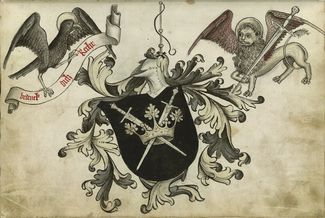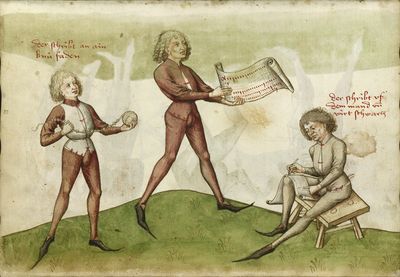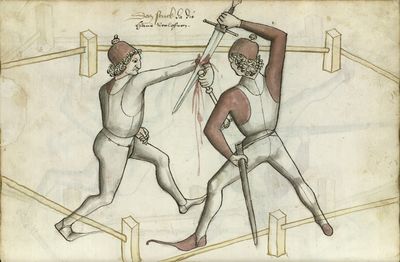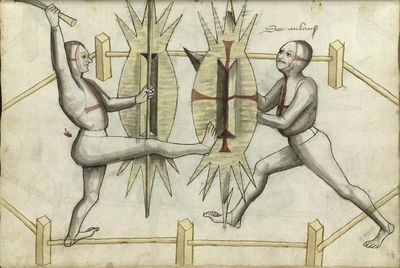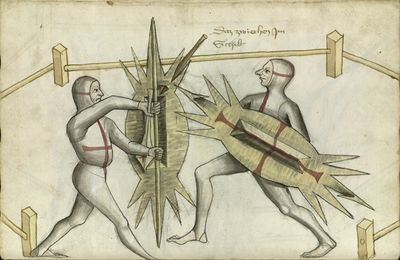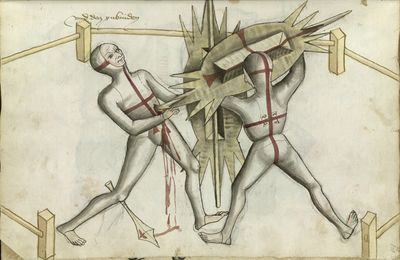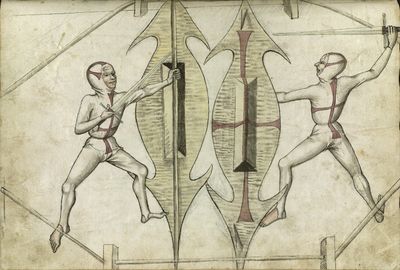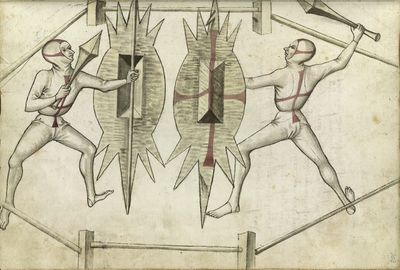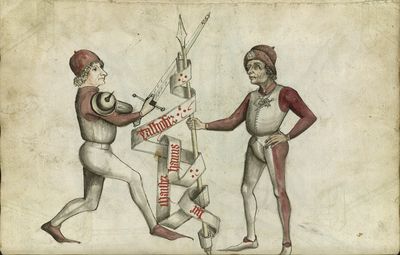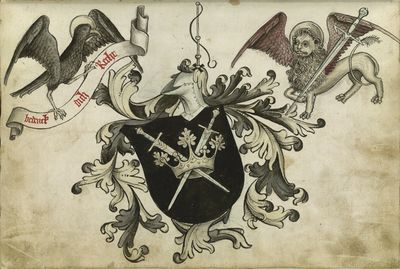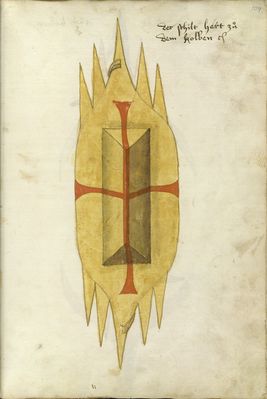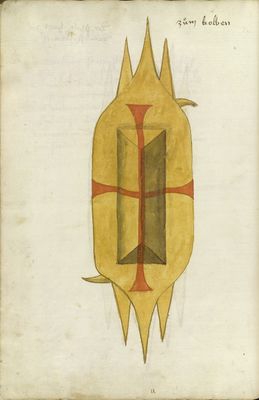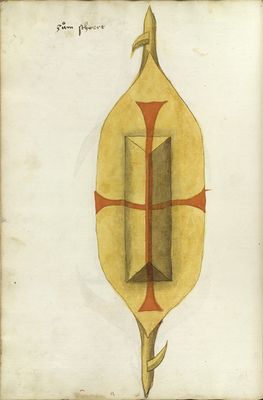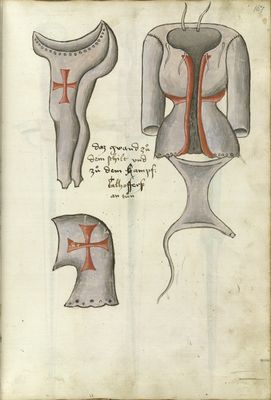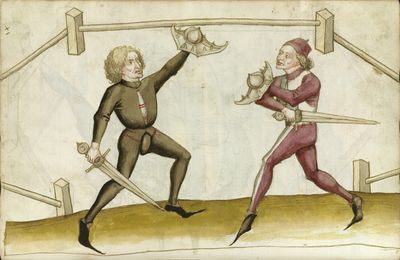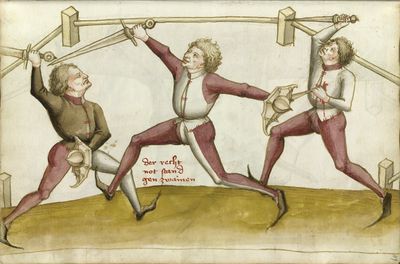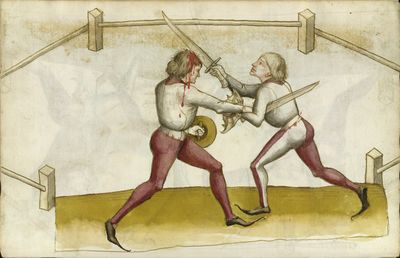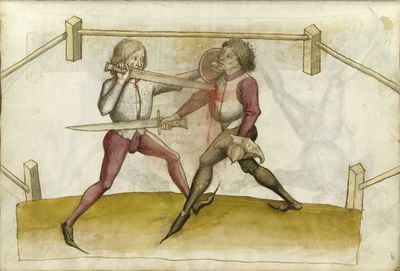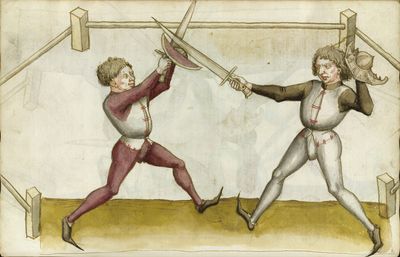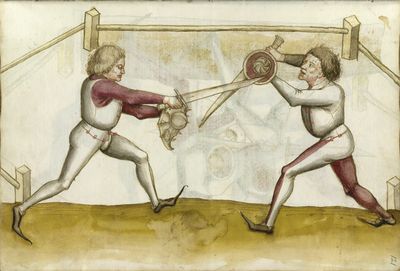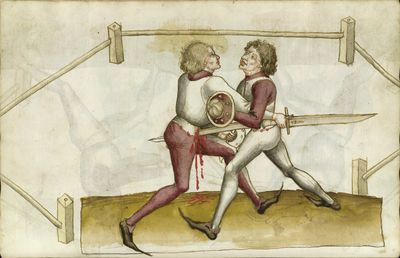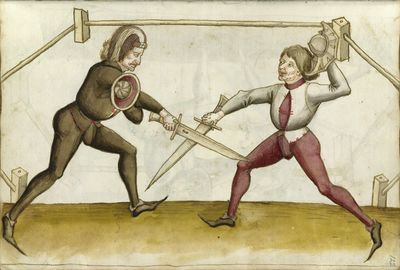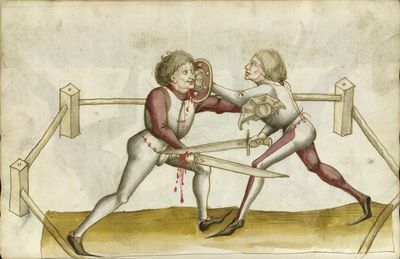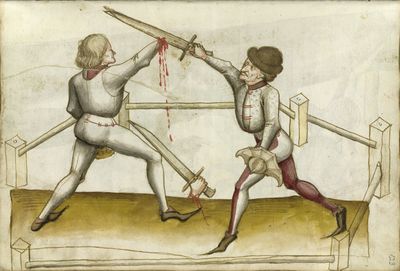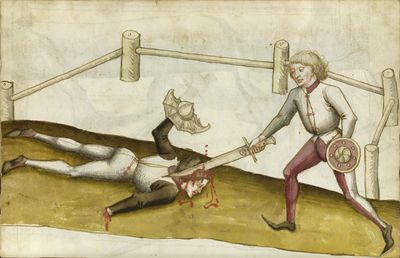Images
|
Complete Translation 
by Jeffrey Hull
|
Transcription [edit]
by Dieter Bachmann
|
|
|
Conclusion of hewing:
Would that your fighting be lucky –
Then be lively, withhold not long the play.
The dandy laugh at that
While the earnest make –
They trust in the sword.
As the Talhoffer does teach:
In the sword you shall have trust and belief,
So that blood runs not over the eyes, etc
|
[1v] Beschliessung der höw
Wiltu daz dirß fechten glück
Bïß frisch verhalt nit lang die stück
Darzuo hypschlich lachen
Und die ernstlichen machen
Daz trow Jm Schwert
Die der talhofer lert
Jm Schwert soltu nyemen trowen noch gelouben
So Rint dir daz bluot nit uber die ougen etc ~
|
|
|
Thus here is the key to Rightful Art, according to all the masters, the sundry hands of converging ways; which is also consigned to memory; and which is the right grounding:
|
Jtem die Sloß der rechten kunst nach dem alß die maister Die abgetailt hand von genähe wegen Daz ouch billich zu behaltent ist wen diß ist der recht grunde
|
|
|
Thus firstly, when you will fight in earnest with someone, then look out for how you and he agree what hour thereafter; thus by all means you act according to pressing need; and keep that to yourself and tell nobody what you have in mind or would do, since the World is so false. And by all means, the gauntlets serve to your vantage; sword and gambeson and leggings and whatever you will that is customary; yet mark how you and he agree upon that – and so then abide by it. Even if the sword has no other right, then it has that which is one’s own and free will. Thus when you come within the barriers and will begin / attack, then let any foe say and do what he will; and cower not within yourself; and have the earnest in mind; and whatever he says unto you, do not react to it; and fight earnestly for yourself thusly; and let him have no rest and become no threat; and follow the art, thus fear not his strikes; and would he draw you into meetings of the blades, then counterstrike merrily.
|
Jtem zu dem ersten wenn du Jn ernst mit ainem fechten wilt So luog wie du mit jm abredst und uff wolche stund nach dem so richt dich nach notturft mit allem zuog und daz tuo selber haimlich Und sag nymant waß du Jm sinn habest oder tun wollest wenn die welt ist also Valsch und richt diu hentschuch nach deim vortail mit Allem zuog Schwert und wameß hosen und waß du Den bruchen wilt und merck aber wie du mit Jm Abredist Dann darby wirt eß beliben wan daz schwert Hat sunst kain recht Dann daz es aigner und fryer will ist Jtem wen du in den schrancken kumpst und an gan wilt So lauß yederman sagen und tun waß er wöll und sich Nit hindersich und hab den ernst jm sinn und waß er mit Dir red da ker dich nit an und ficht ernstlich für Dich daz Und lauß im kain Ruo und trou und folg der kunst furcht nit Sine sleg und wil er ernstlich an Dich zuck jnnß treffen dz uh (!) How wider fröhlich
|
|
|
Thereupon speaks Hans Talhoffer: The good man must speak up for the truth – even when it seems obvious and happens often, etc
|
daran spricht Hanß talhofer der guot man Daz muß er für Die warhait Jehen Wann eß ist Jm ouch Wol Eben dick und offt beschehen etc ~ ~
|
|
|
Here finds one written of judicial combat
Thus what now be decreed as forbidden of all combatants. So by and by, it has become the custom of kaisers and kings, princes and lords, to whom one likens himself and emulates, that one is obliged to fight, especially regarding several causes and articles which are written down hereafter.
|
[8r] hie vint man geschriben von dem kempfen
Item wie daz nun sy daz die die decretaleß kempf verbieten, So hat doch die gewonhait herbracht von kaisern und künigen fürsten und hern noch gestatten und kempfen laussen, und darzu glichen schierm gebent, und besunder und umb ettliche sachn und artikeln, alß her nach geschriben staht.
|
|
|
Yet firstly this – Nobody is happy when one of his comrades cuts him up with loud words. He who would have at dueling with such a comrade, indeed he is within his rights and may well-fight him if he would. Thus dueling is wantonness.
|
Item zu dem ersten maul daz im nymant gern sin Eer laut abschniden mit wortten ainem der sin genoß ist Er wolte Er hebat mit im kempfen wie wol er doch nit recht wol von im kem ob er wolte und darumb so ist kämpfen ain muotwill
|
|
|
Now those aforesaid causes and articles are seven, wherefor a man has duty to fight:
- Thus the first is murder.
- The second is treason.
- The third is heresy.
- The fourth is becoming an urger of disloyalty to one’s lord.
- The fifth is betrayal in strife or otherwise.
- The sixth is falsehood.
- The seventh is using either a maiden or lady.
|
Item der sachen und ardickelen sind siben Darumb man noch pfligt zu kempfen
- Item daz erst ist mortt
- Daz ander verräterniß
- Das dritt ketzery
- Daz vierd wohher an sinem herrn trulos wirt
- Daz fünfft umb fanknuß in striten oder sunsst
- Daz sechst um valsch
- Daz sibent da ainer junckfrowen oder frowen benotzogt
|
|
|
That is why one man challenges another to duel. Such a man shall come before court and shall lay down his case through his own advocacy. Therefor he who accuses shall name the man by baptized name and surname. At the appointed hour it is right that he who calls for the tribunal also complains to three tribunes after the accused comes – unless either one comes not and answers for himself. Yet nobody of one’s ilk may do so, for truly one may answer better for himself. Then the accuser proves his need be just and right. So shall the man under accusation, as much as his accuser, comprehend and likewise this helps the land. Only after all the testimony is done shall verdict be rendered.
|
Item spricht ain man den andern kempflich an, der sol komen für gericht und sol durch sinen fürsprechen sin sach für legen, darumb er in denn an kagt und sol den man nennen mit dem touff namen und zuo namen. So ist recht, daz er in für gericht lad und in dry stund beklag uff dryen gerichten nach ain ander. kumt er denn nit und veranttwurt sich nach nymant von sinen wegen, so mag er sich fürbaß nit mer veranttwurten, [8v] er bewyse dann Ehafte nott als recht sy, so sel man in verurtailen alß fer in daz sin bott innerhalb landes begriffen hant. Je dar nach, alß die ansprach ist gegangen, darnach sol daz urtail ouch gan.
|
|
|
Thus he who was challenged, he comes singularly before the three tribunes to respond and gainsay. Therefor the man who was challenged, he speaks thus that he be blameless and he repeats that the accusations be not true and thereover he would honour with struggle upon that knowledge, as then be right for and required by the land wherein this be and so thereupon is dealt his training-time. So he is dealt six weeks and four days from this tribunal for his training time. Thereupon is also dealt that the men shall struggle as is customary and right in the land. Thus the two men pledge willingly to go before court and struggle against each other – each also with about six weeks of trainingtime in peace, during which either or both are banished if someone breaks peace – thus not until when it is agreed upon as right by the judge.
|
Item der da kempflich angesprochen wirt uff den dryen gerichten und er ainost zuo der antwort kumpt und leugnot darum man in an gesprochen hat und spricht er sy des also unschuldig und der sag uff in daz nit war sy und daz wöll er widerumb mit kempfen beherten und uff in daz wysen alß denn recht sy un dem land darinn eß sy und forttert dar über mit urtail seinen lertag, so werdent im sechß wochen ertailt zu sinem lertag und vier tag von dem gericht werdent im auch ertailt, daruff sie kempfen süllent alß in dem land gewonhait und recht ist. Item versprechent sich zwen man willkürlich gen einander ain kampfez vor gericht, den git an auch sechs wochen lertag und sol in frid bannen baiden, und wolcher under den den frid brech, uber den richtet man on den kampf alß recht ist.
|
|
|
How one may lawfully meet the other.
Thus is one man challenged to fight by another man. The man said to be not as good by the other – he may with right meet that other, if he will. Or if a man would be said or become spurious, then he may instead disregard the duel. Thus indeed the noble challenge the craven to dueling – so may the craven not well disregard that.
|
wie ainer dem anderen mit recht ußgan mag
Item ist daz ein man kempflich angesprochen wiert von aim der nit alß guot ist alß er, dem mag er mit recht uß gan ob er wil oder ob ain man echtloß gesagt würde oder worden wer, dem mag man ouch des kampfes absin. Item spricht aber der edler den mindern an zu kempfen, so mag der den minderen nit wol absin.
|
|
|
Thus why indeed two men may not combat one another; though whichever among them, of the two, may well want to meet the other:
Thus these two men are intent to duel – except they who are within five places of kinship, they may not rectify with one another by dueling; which seven men must swear, who may be of either the paternal or maternal half of either man’s family.
|
[9r] Item wie aber zwen mann nit mit ainender mügent kempfen und wolcher wil under den den zweye dem andern wol uß gan mag
Item wenn zween mann ?gesinnt sind biß uff die fünffte sipp oder näher die mügent durch recht nit mit ein ander kempfen und des müssn siben man schwern die die vatter und muotter halb mäge sind.
|
|
|
Thus how one or the other may disregard the duel, if he has such a handicap as written and stated here:
Thus if a lame man, or one who has bad eyes, becomes challenged to duel. Yet if he may well-manage somehow to meet the sound one, it be then the wise decree to make this person on par with the other; and that wise decree must be done upon their oath; such that just as well the lamed or poorly sighted man thus may well win instead of the other one in any duel of theirs.
|
Item wie aber ainer dem anderen kampfes absin mag mit solichem gelimpf alß hie geschribn stät
Item ob ain lamer man oder einer der böse ougen hett und kampfes an gesprochen wirt der mag sich der auch wol behellffen und dem gesunden usgan, eß sy denn daz wyse lüt daz gelich nach der ?person machen und daz müessent wyß lüt uff ir eid tun und daz also glich machen. Es mag auch der lam oder mit den bosen ougen wol einen an ir statt gewinnen der für iro ainen kempfe.
|
|
|
When thus the six weeks are past and the last day is come, then the judge has summoned them, whereupon shall be combat. So shall they both come before the judge with such training and in such respect as the customs and law teach in the land wherein the duel shall be; or accordingly as they have otherwise willingly agreed and so forth.
|
Item wenn also die sechß wochen uß sind und der letst tag komen ist den in der richter beschaiden haut daruff kempfen sullen, so sullen sie beide für den richter komen mit solichem ertzögen und in solich acht alß die gewonheit und das recht lert in dem lande dar inn sie kempfen sullen oder nach dem alß sie mit einander gewillkürt habent Item etc. -
|
|
|
Thus so there, the complainant shall swear that he therefor has cause for fighting the other; and that he has deemed the other man guilty. And then shall the judge assign a ring and “grit-wardens” and verdict; and counsel wise decrees according to the customs of the land; whereupon the day in the ring arrives for the verdict. One erring man vanquished as honour demands; which he shall take as proof and as rightful / lawful.
|
Item so soll da der cleger schweren daz er der sach darum er dem ainen man zugesprochen haut schuldig sy und denn so sol man in ainen ring machen und grieß wartten und urttail geben [9v] nach wyser lute raut und nach des landeß gewonhait. Und wer uff den tag in den ring nit kumpt den urttailt man sigeloß in irre denn Ehafte nott die sol er bewysen alß recht ist -
|
|
|
Here is stated how one shall hold oneself when the combatants are come into the ring upon the appointed hour, at which time one thus shall duel the other adversarily:
When the combatants are thus come into the ring, then the judge of that hour shall stare at all there; and advise that hiding is forbidden, by health and wealth; and that he shall not allow one or the other to be aided by someone else; thus shall each both do combat exclusively; so may the judge intimidate any rabble.
|
Hie staut wie man sich halten sol wenn die kempfer in dem ring komen sind uff die stund und uff die zit so man pheindiglich kempfen sol
WEnn die kempfer also in den ring komen sind So sol der richter von stund an alle stür und ler vestecklich verbieten by lyb und guot und sol nicht gestatten daz man einem für den andern nicht zulege und sel inß beiden machen so er imer gelichest mag ungenerde.
|
|
|
That which is lawful if one of the combatants flees out, or becomes driven out, of the ring:
Thus whichever combatant comes out of the ring, before then the duel has its deadly ending, because he becomes knocked out of the ring by the other or he flees thereout, or however else he comes thereout; or he admits that the other man’s position regarding the cause for challenge is right – then shall that man be adjudged vanquished, or otherwise slain and killed; for another man has conquered him. Then a man shall rectify indeed as is lawful and customary in the land. And thereby they have battled one another.
|
Das ist was recht wer ob der kempfer ainer uss dem ring fluch oder getriben wurd
Item wolcher kempfer uss dem ring kumpt Ee denn der kampf ain ende haut Er werde daruß geschlagen von dem andern oder fluche daruß oder wie er daruß käme oder aber ob er der sache vergicht darum man in denn mit recht an gesprochen haut, den sol man sigeloß urttailen. Oder wolcher den andern erschlecht und ertötett der haut gesiget. Dem sol man aber richten alß des landes gewonhait und recht ist darumb sie dem mit ainander gekemppffet hand.
|
|
|
Now mark this bond that you need to understand:
Thus firstly you should know well the master who will teach you; that his art be right and protective; and that he be pious / sober; and that he not embezzle you; and that he not shorten / beguile the lore; and that he wits to broaden the arsenal wherewith he will battle. However – should that master not accept that, swearing upon his profits ingratiatingly and his prejudices devotedly and thus shall his ilk become masters because of him – then swear neither to further nor to teach his so-called art.
|
[10r] Nun merck uff dissen punten der ist notturfftlich zu uerstend
Item des ersten so soltu den maister wol erkennen der dich lerren wil dz sin kunst recht und gewer sy und dz er frum sy und dich nit veruntruwe und dich nit verkürtz in der lerr und wiß die gwer zü zerbraitten da mit er kempfen wil. Och sol er den maister nit uff nemen er schwer im dann sin frumen zwerbent und sin schaden zwendent deß glich sol er dem maister wider um sweren sin kunst nit witter zleren.
|
|
|
Here heed the master:
Thus the master, who has a student to teach, he shall wit that he recognise well the man whom he will teach; whether he be weak or strong and if he be coxcombraging or gentle-minded; whether he has good breathing / endurance or not; and whether he may work heartily. So when you the master have well-recognised him as into the lore and what work he is able to do, thereafter you must teach the student such that it avails him against his foes. Yet the combatant and the master shall guard that they let no man see them nor also the arsenal with which they work. And they both shall guard their doings from much of society; and say little of the fighting, so that no notice is made thereof.
|
Hie merck uff den maister
Item der maister der ain understat zu leren, der sol wißen daß er den man wol erken, den er lerren wil, ob er sie schwach oder starck, und ob er gäch zornig sy oder senftmüttig, och ob er gütten auttem hab oder nit, och ob er arbaitten müg in die in die ?harr; und wenn du inn wol erkunet haust in der lerr, un wz arbait er uermag dar nach müstu in lerren dz im nütz ist gen sinen vind. Och sol der kempffer und der maister sich hütten dz sie niemand zu sehen laussend und in sunder sie gwer da mit sy arbaittent und sich baid hütten vor vil geselschafft und von dem vechten wenig sagen dz kain abmercken da von kom.
|
|
|
About patronage:
How the combatant and the master want to relate: Remit the fee and reciprocate. What be his nature? If he be strong or weak, if yet he be coxcomb-raging or not; and how his top heats up if someone would quarrel or fight. It is also needful to wit by the master who teaches him: That the man strives to set himself aright.
|
von kuntschafft
wie der kempffer und der maister kuntschafft möchte hon zu rem widertail, wz sin wesen wer, ob er sy strarck oder swach, ob er och sy gechzornig oder nit, und wie sin touff nam hieß, ob man wölt dar uß bracticiern oder rechnen. Ws ist och nottürfftig zu wissen wz maister in lerr dz man sich darnach müg richten
|
|
|
When now the combatant is taught and shall go within the barriers:
So firstly, when he shall fight, accordingly shall he hear a priest say mass, in honour of Our Lady Mary and of Saint George patron of knights, and the priest shall bless him in the name of Saint John of the gospel, with which the combatant agrees. Thereafter the master shall try earnestly to advise the combatant one last time; whereupon the combatant shall stay; and shall fathom nothing, yet focus upon his foe and earnestly look at him.
|
wenn er nun gelert ist und in den schrancken sol gon
So sol er zu dem ersten bichten, dar nach sol im ain priester ain meß lesen von unßer frowen und von sant jörgen, und der priester sol im segnen sant johanns myne und dem kempfer geben. Dar nach sol der maister in ernstlich versüchen [10v] und inn under richten dar uff er bliben sol, und sol in uff kein ding haissen acht hon dann uff sin vind, und den ernstlich an schowen.
|
|
|
Mark the presentation when one thus comes within the barriers:
So shall he make one cross with the right foot and one cross with the right hand at his breast and shall sign in the name of the Father and Son and the Holy Ghost. The grit-wardens bearing staves or spears take the men in and present them and they turn round in the Sun. So then shall each combatant bid well the witnessing princes and lords; and they stand around the circle, as each bids God would help him and would give him victory over his foe, as He has truth and right.
|
Merck uff dz infüeren
Item wenn der man kompt in den schrancken so sol er machen mit dem rechten fuß ain krütz und mit der hand aines an an die brust und sol fürsich gon im namen des vatters und sunes und des hailigen gaistes. Dann sind in die grießwartten nemen und sind inn fürren gegen der sunnen umbhe. So sol dann der kempfer die fürsten und herren bitten und die umb den kraiß stand dz sy im wölle helffen got bitten dz er im sig wölle geben gegen sinem vind und alz er war und recht hab.
|
|
|
Thereafter shall one sit down in the chair:
When he is now seated, so shall someone overspan him with a tent, and his bier is behind him at the barriers, and his arsenal is well-arrayed and is lawful and ready for his needs / as required by court.
|
Dar nach sol man in setzen in den sessel
Wenn er nun gesessen ist so soll man im fürspannen ain tüch und sin bar hinder im an den schrancken und sine gwer sind wol gehenckt sin und gericht nach nottürfft
|
|
|
The grit-wardens or armigers:
The master and grit-wardens should heed the judge, or whomever else then as agreed previously. Dueling is started at the first call – so shall he the judge call the combatants to stand up and draw up from the tents; and when he has called for the third time, calling them by name, then he goes thence and commends them unto God.
|
Die grieß wartten oder täpffer
Der maister und die grieß wartten söllend mercken uff den richter oder uff den, der den kampff an lauffen wirt. Wann der rüfft zu dem ersten mal, so sol er den man haisen uff ston un dz tüch von im ziehen, und wann man rüfft zü dem dritten mäl so sol er in haissen hin gon und in got enpfelhen.
|
|
|
He “inscribes” a message within a knotted twine
- He records the words of the mouth upon paper and those shall become black later.
|
[11r] der schribt an ain knü faden
- der schribt uf dem mund und wirt schwartz
|
|
|
|
[11v] [No text]
|



